Talk to our experts
1800-120-456-456
- Stephen Hawking Essay


All You Need to Know for Preparation
Stephen Hawking was one of the greatest scientists of the century. He was a very unique person. He proposed and proved many theories. He explained the theory of the black hole. He wrote a book called ‘The Brief History of Time’ in which he explained about the black hole. He also described the concepts of relativity and big-bang theory in this book.
Stephen Hawking is an inspiration to all of us. He suffered from a fatal motor neuron disease that affected his spinal cord. He was diagnosed with this disease in his early 20’s and doctors predicted that he was not likely to live more than 5years. His body was paralyzed and he moved about in a wheelchair for the rest of his life. Though he could not sit up straight, yet he kept working on his theories of Physics and amazed the medical experts by surviving for 55 more years.
Stephen Hawking was born in Oxford on January 8, 1942. He was born in very adverse circumstances. His parents were not well off and he was born during the Second World War. It was believed that Germany would attack Britain at any time. At that time, Oxford was considered a safe place, so Stephen Hawking’s parents moved to Oxford. His father's name was Frank and his mother's name was Isobel Hawkins. Isobel worked as a secretary in the Medical Research Institute, and Frank was a Medical Researcher. In 1950, when Hawkins's father became the Head of the Division of Parasitology at the National Institute of Medical Research, the family moved to St. Albans.
In the early days of the academy, Stephen Hawking was a good student. He loved board games. According to his friends, Hawkins, along with the rest of his friends, had created a game that only they used to play among themselves. Together with his friends, he had made a computer putting together the recycled parts so that he could use it to solve complex mathematical equations. When Stephen Hawking joined Oxford University, he was 17 years old. He wanted to study Math there but there was no specialized degree in Math, so he turned to Physics, and later he turned towards Cosmology. After graduating in natural science in 1962, he went to Cambridge University to pursue a PhD in cosmology. In 1968, he was made a member of Cambridge's Institute of Astronomy which gave a new direction to his research. That is when he started research on the black hole. He was then inducted into the Royal Society in 1974, a World Wide Fellowship of Scientists. In 1979, he became an Education Professor of Mathematics at Cambridge University, which is regarded as the most famous academic chair in the world.
Fight with His Disease
Stephen Hawking, at the age of 21, was diagnosed with a motor neuron disease (MND) (also known as amyotrophic lateral sclerosis (ALS)) disease. It is a dangerous neurological disease, due to which the nerve cells that control the movement of the muscles of the body gradually stop working, due to which the body gets paralyzed. When he was in Oxford, he felt many times that he was not well, sometimes he used to fall suddenly while walking, or used to stop completely while speaking. He became very clumsy. However, he continued to ignore all these things before 1963 and did not tell anyone about it.
When his father saw his condition in 1963, he took him to the doctor and he was diagnosed with motor neuron disease (MND) (also known as amyotrophic lateral sclerosis (ALS)). Doctors said that Stephen Hawking would only be able to stay alive for the next few years. His illness became a big reason for him to carry out his studies and he became a great scientist. Hawking himself said that until he was not diagnosed with the disease, his life was very boring. However, after diagnosis, when he came to know that he would be able to live for only a few years, he had put all his attention in his work and research so that he could fully utilize his remaining life. His illness captured him slowly, and as result, he was no longer able to walk due to which he had to move about in a wheelchair. He lost his voice completely in the year 1985. At this time, his condition was so bad that he was kept in 24 hours medical surveillance, and California’s computer programmers came to help him. They developed software that works based on eye movement.
Contribution Towards Science
In his research, he found that if this universe started with the Big Bang, then it would end with the Big Bang. He also explained Albert Einstein's theory of relativity. Using the General Theory of Relativity and Quantum Theory together, he gave us the concept of Hawking Radiation in which we came to know that Black Holes do not always exist, they leave the Hawking Radiation continuously. Hawking also explained the concept of Penrose– Hawking theorems, Blackhole information paradox, Micro black hole, Primordial black hole, Chronology protection conjecture, Soft hair (No hair theorem), Bekenstein–Hawking formula, Hawking energy, Hawking-Page phase transition.
Conclusion:
Stephen Hawking died on 14 March 2018 at his home. A man whose body didn’t support him achieved all so much that he became an inspiration for the next generations. Stephen Hawking used to give lectures even when he was not well. Motivate people to do a PhD. Stephen Hawking always used to say the same thing, no matter how difficult life may be, you can always do something, you can be successful if you work hard. An inspirational message for everyone.

FAQs on Stephen Hawking Essay
1. Where can I find an essay on the topic - Stephan Hawking?
Writing essays is one of the important learnings to a student of any class.
Writing them not only helps students in the subject they are learning, but they also help them in making them more competent and clear in their language skills. When students do well in their studies, it is very likely that they do well in all their skills and subjects.
Writing essays is not a hard task. Students have to come up with ideas, make a topic they are interested in writing about, and put all this in order. That is pretty much it. But the thing is, students have different styles in writing and they all need to be known in order for the students to be able to make their essay look like the style they want it to have. You can find it on the Vedantu app or website.
2. Is the topic Stephan Hawking a topic for students?
Yes, Stephan Hawking is one of the great personalities and noblemen every student should know in their schooling. His ideologies inspire students to overcome their fears and face challenges with confidence. At some point in time, students might develop self-doubt and feel under-confident, therefore a topic like this would improve their thought process and gain confidence.
3. Is it important to write essays?
Essay writing is one of the important skills every student should learn because it helps us in improving our sentence framing, use of appropriate words, learning about diverse topics around us and many more. Therefore the habit of writing essays should be developed once the basics of writing are taught.
4. Can I copy essays?
There is nothing wrong with copying essays.I know that you want to be extra careful. You want to be able to make sure that you are not using anyone’s original work. There is a chance that you might be copied and it will be a big deal. This is why you may have to make it difficult for them to copy the essays. You are just giving them the information that they need to make their own samples. I think that it is important for them to see the example essays, so that they understand how the essay should be written. They may see a style that you don’t approve of, so they will want to try and mimic what you are doing. It will give them some confidence.
5. Does writing essays improve English?
When you write a long piece of text, usually in English, there is a lot to be done. You need to write a good introduction, you have to choose a good title, you have to explain what the main idea is, you have to describe the structure of the text in a few sentences, and so on. As you can see, writing an essay requires many different skills, and you need to do them all right. You can check your language level after writing a test and see how your language has improved, but this is not enough. The best way to know what happens is to ask yourself a few questions.
6. Stephen Hawking Suffering from Which Disease? How Did it Affect His Body?
Stephen Hawking suffered from motor neuron disease (MND) (also known as amyotrophic lateral sclerosis (ALS)). It’s a dangerous disease which paralyzed his entire body. Due to this, he could neither walk nor speak. Hawkins himself said that until he had not been diagnosed with that disease, his life was very boring. After he got to know that he can only live for 2 years in a proper way he concentrated on his researchers and lived his life to the fullest. His illness became a big reason for him to become a great scientist.
Stephen Hawking biography: Theories, books & quotes
A brief history of theoretical physicist Stephen Hawking.
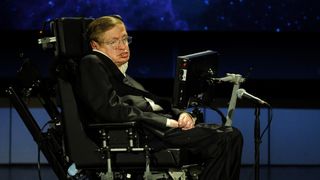
- Scientific achievements
- Filmography
- Quotes and controversial statements
Additional resources
Stephen Hawking is regarded as one of the most brilliant theoretical physicists in history.
His work on the origins and structure of the universe, from the Big Bang to black holes, revolutionized the field, while his best-selling books have appealed to readers who may not have Hawking's scientific background. Hawking died on March 14, 2018 , at the age of 76.
Stephen Hawking was seen by many as the world's smartest person, though he never revealed his IQ score. When asked about his IQ score by a New York Times reporter he replied, "I have no idea, people who boast about their IQ are losers," according to the news site The Atlantic .
Related: 4 bizarre Stephen Hawking theories that turned out to be right (and 6 we're not sure about)
In this brief biography, we look at Hawking's education and career — ranging from his discoveries to the popular books he's written — and the disease that robbed him of mobility and speech.
The early life of Stephen Hawking
British cosmologist Stephen William Hawking was born in Oxford, England on Jan. 8, 1942 — 300 years to the day after the death of the astronomer Galileo Galilei . He attended University College, Oxford, where he studied physics, despite his father's urging to focus on medicine. Hawking went on to Cambridge to research cosmology , the study of the universe as a whole.
In early 1963, just shy of his 21st birthday, Hawking was diagnosed with motor neuron disease, more commonly known as Lou Gehrig's disease or amyotrophic lateral sclerosis (ALS) . Doctors told Hawkings that he would likely not survive more than two years with the disease. Completing his doctorate did not appear likely, but Hawking defied the odds. He also obtained his PhD in 1966 for his thesis entitled " Properties of expanding universes ". In that same year, Hawking also won the prestigious Adams Prize for his essay entitled "Singularities and the Geometry of Space-Time".
From then Hawking went on to forge new roads into the understanding of the universe in the decades since.
As the disease spread, Hawking became less mobile and began using a wheelchair. Talking grew more challenging and, in 1985, an emergency tracheotomy caused his total loss of speech. A speech-generating device constructed at Cambridge, combined with a software program, served as his electronic voice, allowing Hawking to select his words by moving the muscles in his cheek.
Just before his diagnosis, Hawking met Jane Wilde, and the two were married in 1965. The couple had three children before separating in 1990. Hawking remarried in 1995 to Elaine Mason but divorced in 2006.
Stephen Hawking's greatest scientific achievements
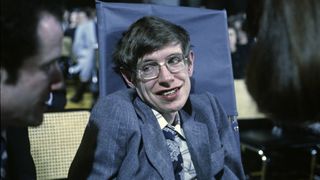
Throughout his career, Hawking proposed several theories regarding astronomical anomalies, posed curious questions about the cosmos and enlightened the world about the origin of everything. Here are just some of the many milestones Hawking made in the name of science.
In 1970, Hawkings and fellow physicist and Oxford classmate, Roger Penrose, published a joint paper entitled " The singularities of gravitational collapse and cosmology ". In this paper, Hawking and Penrose proposed a new theory of spacetime singularities — a breakdown in the fabric of the universe found in one of Hawking's later discoveries, the black hole. This early work not only challenged concepts in physics but also supported the concept of the Big Bang as the birth of the universe, as outlined in Albert Einstein's theory of general relativity in the 1940s.
Over the course of his career, Hawking studied the basic laws governing the universe. In 1974, Hawking published another paper called " Black hole explosions? ", in which he outlined a theorem that united Einstein's theory of general relativity, with quantum theory — which explains the behavior of matter and energy on an atomic level. In this new paper, Hawking hypothesized that matter not only fell into the gravitational pull of black holes but that photons radiated from them — which has now been confirmed in laboratory experiments by the Technion-Israel Institute of Technology in Israel — aptly named "Hawking radiation".
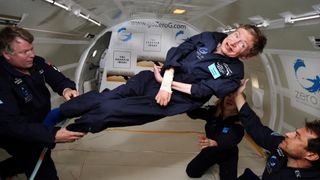
In 1974, Hawking was inducted into the Royal Society, a worldwide fellowship of scientists. Five years later, he was appointed Lucasian Professor of Mathematics at Cambridge, the most famous academic chair in the world (the second holder was Sir Isaac Newton , also a member of the Royal Society).
During the 1980s, Hawking turned his attention to the Big Bang and the uncertainties about the beginning of the universe. "Events before the Big Bang are simply not defined, because there’s no way one could measure what happened at them. Since events before the Big Bang have no observational consequences, one may as well cut them out of the theory and say that time began at the Big Bang," he said during his lecture called The Beginning of Time . In 1983, Hawking, along with scientists James Harlte, published a paper outlining their " no-boundary proposal " for the universe. In their paper, Hawking and Hartle describe the shape of the universe as reminiscent of a shuttlecock — with the Big Bang at the narrowest point and the expanding universe emerging from it.
Related: Can we time travel? A theoretical physicist provides some answers
Books by Stephen Hawking
In the last three decades of Hawking's life, he not only continued to publish academic literature, but he also published several popular science books to share his theories of the history of the universe with the layperson. His most popular book " A Brief History of Time " (10th-anniversary edition: Bantam, 1998) was first published in 1988 and became an international bestseller. It has sold almost 10 million copies and has been translated into 40 different languages.
Hawking went on to write other nonfiction books aimed at non-scientists. These include " A Briefer History of Time ," " The Universe in a Nutshell ," " The Grand Design " and " On the Shoulders of Giants ."
Along with his many successful books about the inner workings of the universe, Hawking also began a series of science fiction books called " George and the Big Bang ", with his daughter Lucy Hawking in 2011. Aimed at middle school children, the series follows George's adventures as he travels through space.
Stephen Hawking's filmography
Hawking has made several television appearances, including a playing hologram of himself on "Star Trek: The Next Generation" and a cameo on the television show "Big Bang Theory." He has also voiced himself in several episodes of the animated series "Futurama" and "The Simpson". In 1997, PBS also presented an educational miniseries titled " Stephen Hawking's Universe ," which probes the theories of the cosmologist.
In 2014, a movie based on Hawking's life was released. Called "The Theory of Everything," the film drew praise from Hawking , who said it made him reflect on his own life. "Although I'm severely disabled, I have been successful in my scientific work," Hawking wrote on Facebook in November 2014. "I travel widely and have been to Antarctica and Easter Island, down in a submarine and up on a zero-gravity flight. One day, I hope to go into space."
Related: The Theory of Everything: Searching for the universal rules of physics
Stephen Hawking's quotes and controversial statements
Hawking's quotes range from notable to poetic to controversial. Among them:
- "Even if there is only one possible unified theory, it is just a set of rules and equations. What is it that breathes fire into the equations and makes a universe for them to describe? The usual approach of science of constructing a mathematical model cannot answer the questions of why there should be a universe for the model to describe. Why does the universe go to all the bother of existing? "— A Brief History of Time: From the Big Bang to Black Holes , 1988
- "All of my life, I have been fascinated by the big questions that face us, and have tried to find scientific answers to them. If, like me, you have looked at the stars, and tried to make sense of what you see, you too have started to wonder what makes the universe exist."— Stephen Hawking's Universe , 1997.
- "Science predicts that many different kinds of universe will be spontaneously created out of nothing. It is a matter of chance which we are in." — The Guardian, 2011 .
- "We should seek the greatest value of our action." — The Guardian, 2011.
- "The whole history of science has been the gradual realization that events do not happen in an arbitrary manner, but that they reflect a certain underlying order, which may or may not be divinely inspired. "— A Brief History of Time: From the Big Bang to Black Holes , 1988.
- "The greatest enemy of knowledge is not ignorance, it is the illusion of knowledge."
- "It is not clear that intelligence has any long-term survival value." — Life in the Universe , 1996.
- "One cannot really argue with a mathematical theorem." — A Brief History of Time: From the Big Bang to Black Holes , 1988.
- "It is a waste of time to be angry about my disability. One has to get on with life and I haven't done badly. People won't have time for you if you are always angry or complaining." — The Guardian, 2005 .
- "I relish the rare opportunity I've been given to live the life of the mind. But I know I need my body and that it will not last forever." — Stem Cell Universe , 2014.
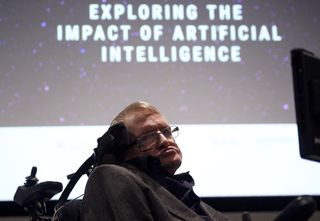
A list of Hawking quotes would be incomplete without mentioning some of his more controversial statements.
He frequently said that humans must leave Earth if we wished to survive.
- "It will be difficult enough to avoid disaster in the next hundred years, let alone the next thousand or million...Our only chance of long-term survival is not to remain inward-looking on planet Earth, but to spread out into space," he said during an interview with video site Big Think , 2010.
- "[W]e must … continue to go into space for the future of humanity…I don't think we will survive another 1,000 years without escaping beyond our fragile planet," Hawking said during a lecture at the Oxford Union debating society , 2016.
- "We are running out of space and the only places to go to are other worlds. It is time to explore other solar systems. Spreading out may be the only thing that saves us from ourselves. I am convinced that humans need to leave Earth," he said during a speech at the Starmus Festival in Norway, 2017.
He also said time travel should be possible, and that we should explore space for the romance of it.
"Time travel used to be thought of as just science fiction, but Einstein's general theory of relativity allows for the possibility that we could warp space-time so much that you could go off in a rocket and return before you set out. I was one of the first to write about the conditions under which this would be possible. I showed it would require matter with negative energy density, which may not be available. Other scientists took courage from my paper and wrote further papers on the subject," he told the new site Parade in 2010. "Science is not only a disciple of reason, but, also, one of romance and passion," he adds.
The theoretical physicist was also concerned that robots could not only have an impact on the economy but also mean doom for humanity.
"The automation of factories has already decimated jobs in traditional manufacturing, and the rise of artificial intelligence is likely to extend this job destruction deep into the middle classes, with only the most caring, creative or supervisory roles remaining," he wrote in a 2016 column in The Guardian .
"The development of full artificial intelligence could spell the end of the human race," he told the BBC in 2014. Hawking added, however, that AI developed to date has been helpful. It's more the self-replication potential that worries him. "It would take off on its own, and re-design itself at an ever-increasing rate. Humans, who are limited by slow biological evolution, couldn't compete, and would be superseded."
"The genie is out of the bottle. I fear that AI may replace humans altogether," Hawking told WIRED in November 2017.
An avowed atheist, Hawking also occasionally waded into the topic of religion.
- "Because there is a law such as gravity, the universe can and will create itself from nothing. Spontaneous creation is the reason there is something rather than nothing, why the universe exists, why we exist. It is not necessary to invoke God to light the blue touch paper and set the universe going." — The Grand Design, by Stephen Hawking and Leonard Mlodinow.
- "I regard the brain as a computer which will stop working when its components fail…There is no heaven or afterlife for broken down computers; that is a fairy story for people afraid of the dark," he said during a 2011 interview with The Guardian .
- "Before we understand science, it is natural to believe that God created the universe. But now science offers a more convincing explanation. What I meant by 'we would know the mind of God' is, we would know everything that God would know, if there were a God, which there isn't. I'm an atheist," Hawking said in a 2014 interview with the news site El Mundo .
For more information about Stephen Hawking, his theories and read through the many transcriptions of his influential lectures, check out his official website . You can also watch Hawking probe the origins of the cosmos in his extraordinary TED talk .
Bibliography
#5: Stephen Hawking’s warning: Abandon earth-or face extinction . Big Think. (2010, July 27). https://bigthink.com/surprising-science/5-stephen-hawkings-warning-abandon-earth-or-face-extinction/
Beck, J. (2017, October 11). “people who boast about their IQ are losers.” The Atlantic. https://www.theatlantic.com/science/archive/2017/10/trump-tillerson-iq-brag-boast-psychology-study/542544/
The beginning of time . Stephen Hawking. (n.d.-c). https://www.hawking.org.uk/in-words/lectures/the-beginning-of-time
Guardian News and Media. (2005, September 27). Interview: Stephen Hawking . The Guardian. https://www.theguardian.com/science/2005/sep/27/scienceandnature.highereducationprofile
Guardian News and Media. (2011a, May 15). Stephen Hawking: “there is no heaven; it’s a Fairy story.” The Guardian. https://www.theguardian.com/science/2011/may/15/stephen-hawking-interview-there-is-no-heaven
Guardian News and Media. (2011b, May 15). Stephen Hawking: “there is no heaven; it’s a Fairy story.” The Guardian. https://www.theguardian.com/science/2011/may/15/stephen-hawking-interview-there-is-no-heaven
Guardian News and Media. (2016, December 1). This is the most dangerous time for our planet | Stephen Hawking . The Guardian. https://www.theguardian.com/commentisfree/2016/dec/01/stephen-hawking-dangerous-time-planet-inequality
Hartle, J. B., & Hawking, S. W. (1983, December 15). Wave function of the universe . Physical Review D. https://journals.aps.org/prd/abstract/10.1103/PhysRevD.28.2960
Hawking radiation and the sonic black hole - technion - israel institute of technology . Technion. (2021, February 17). https://www.technion.ac.il/en/2021/02/hawking-radiation-and-the-sonic-black-hole/
Hawking, S. W. (1974, March 1). Black Hole Explosions? . Nature News. https://www.nature.com/articles/248030a0
Life in the universe . Stephen Hawking. (n.d.-a). https://www.hawking.org.uk/in-words/lectures/life-in-the-universe
Medeiros, J. (2017, November 28). Stephen Hawking: “I fear ai may replace humans altogether.” WIRED UK. https://www.wired.co.uk/article/stephen-hawking-interview-alien-life-climate-change-donald-trump
Oxford Union Speech . Stephen Hawking. (n.d.-b). https://www.hawking.org.uk/in-words/speeches/speech-5
Pablo Jáuregui, Enviado especial Guía de Isora (Tenerife), & Chocolatillo. (2018, March 14). Stephen Hawking: “no hay ningún dios. soy ateo.” ELMUNDO. https://www.elmundo.es/ciencia/2014/09/21/541dbc12ca474104078b4577.html
The singularities of gravitational collapse and cosmology . Royal Society Publishing. (1970, January 27). https://royalsocietypublishing.org/doi/10.1098/rspa.1970.0021
Hawking, S. W. (1966). Properties of expanding universes. https://doi.org/10.17863/CAM.11283
Join our Space Forums to keep talking space on the latest missions, night sky and more! And if you have a news tip, correction or comment, let us know at: [email protected].
Get the Space.com Newsletter
Breaking space news, the latest updates on rocket launches, skywatching events and more!
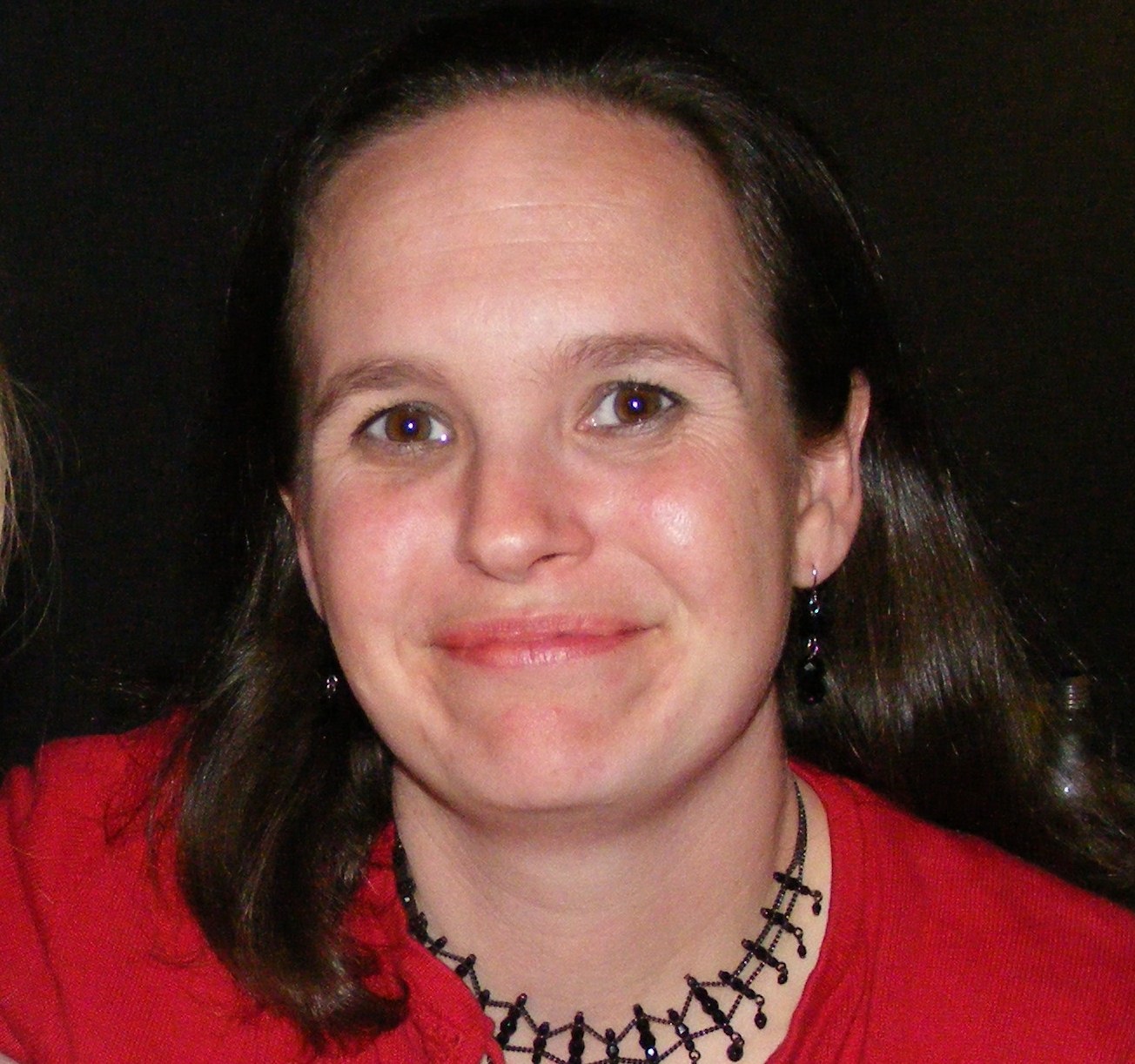
Nola Taylor Tillman is a contributing writer for Space.com. She loves all things space and astronomy-related, and enjoys the opportunity to learn more. She has a Bachelor’s degree in English and Astrophysics from Agnes Scott college and served as an intern at Sky & Telescope magazine. In her free time, she homeschools her four children. Follow her on Twitter at @NolaTRedd
- Scott Dutfield Contributor
NASA gets $25.4 billion in White House's 2025 budget request
'Interstellar meteor' vibrations actually caused by a truck, study suggests
Stars, planets and more will be visible during the total solar eclipse on April 8. Here's where to look
Most Popular
By Fran Ruiz January 29, 2024
By Fran Ruiz January 26, 2024
By Conor Feehly January 05, 2024
By Keith Cooper December 22, 2023
By Fran Ruiz December 20, 2023
By Fran Ruiz December 19, 2023
By Fran Ruiz December 18, 2023
By Tantse Walter December 18, 2023
By Robert Lea December 05, 2023
By Robert Lea December 04, 2023
By Robert Lea December 01, 2023
- 2 Total solar eclipse 2024: Live updates
- 3 Why I'm going to Missouri near the centerline for the solar eclipse on April 8
- 4 New 'Star Wars: Unlimited — Spark of Rebellion' trading card game strikes our galaxy
- 5 There's an April Fools' Day prank about the 2024 solar eclipse — don't fall for it
Stephen Hawking
Stephen Hawking was a scientist known for his work with black holes and relativity, and the author of popular science books like 'A Brief History of Time.'
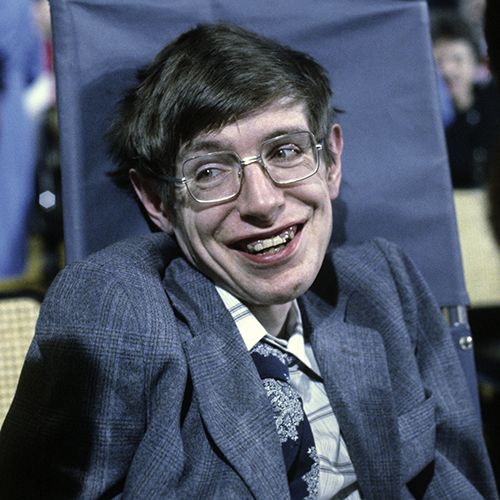
(1942-2018)
Who Was Stephen Hawking?
Stephen Hawking was a British scientist, professor and author who performed groundbreaking work in physics and cosmology, and whose books helped to make science accessible to everyone.
Hawking was born on January 8, 1942, in Oxford, England. His birthday was also the 300th anniversary of the death of Galileo — long a source of pride for the noted physicist.
The eldest of Frank and Isobel Hawking's four children, Hawking was born into a family of thinkers.
His Scottish mother earned her way into Oxford University in the 1930s — a time when few women were able to go to college. His father, another Oxford graduate, was a respected medical researcher with a specialty in tropical diseases.
Hawking's birth came at an inopportune time for his parents, who didn't have much money. The political climate was also tense, as England was dealing with World War II and the onslaught of German bombs in London, where the couple was living as Frank Hawking undertook research in medicine.
In an effort to seek a safer place, Isobel returned to Oxford to have the couple's first child. The Hawkings would go on to have two other children, Mary and Philippa. And their second son, Edward, was adopted in 1956.
The Hawkings, as one close family friend described them, were an "eccentric" bunch. Dinner was often eaten in silence, each of the Hawkings intently reading a book. The family car was an old London taxi, and their home in St. Albans was a three-story fixer-upper that never quite got fixed. The Hawkings also housed bees in the basement and produced fireworks in the greenhouse.
In 1950, Hawking's father took work to manage the Division of Parasitology at the National Institute of Medical Research, and spent the winter months in Africa doing research. He wanted his eldest child to go into medicine, but at an early age, Hawking showed a passion for science and the sky.
That was evident to his mother, who, along with her children, often stretched out in the backyard on summer evenings to stare up at the stars. "Stephen always had a strong sense of wonder," she remembered. "And I could see that the stars would draw him."
Hawking was also frequently on the go. With his sister Mary, Hawking, who loved to climb, devised different entry routes into the family home. He loved to dance and also took an interest in rowing, becoming a team coxswain in college.
Early in his academic life, Hawking, while recognized as bright, was not an exceptional student. During his first year at St. Albans School , he was third from the bottom of his class.
But Hawking focused on pursuits outside of school; he loved board games, and he and a few close friends created new games of their own. During his teens, Hawking, along with several friends, constructed a computer out of recycled parts for solving rudimentary mathematical equations.
Hawking entered University College at the University of Oxford at the age of 17. Although he expressed a desire to study mathematics, Oxford didn't offer a degree in that specialty, so Hawking gravitated toward physics and, more specifically, cosmology.
By his own account, Hawking didn't put much time into his studies. He would later calculate that he averaged about an hour a day focusing on school. And yet he didn't really have to do much more than that. In 1962, he graduated with honors in natural science and went on to attend Trinity Hall at the University of Cambridge for a Ph.D. in cosmology.
In 1968, Hawking became a member of the Institute of Astronomy in Cambridge. The next few years were a fruitful time for Hawking and his research. In 1973, he published his first, highly-technical book, The Large Scale Structure of Space-Time , with G.F.R. Ellis.
In 1979, Hawking found himself back at the University of Cambridge, where he was named to one of teaching's most renowned posts, dating back to 1663: the Lucasian Professor of Mathematics.
DOWNLOAD BIOGRAPHY'S STEPHEN HAWKING FACT CARD
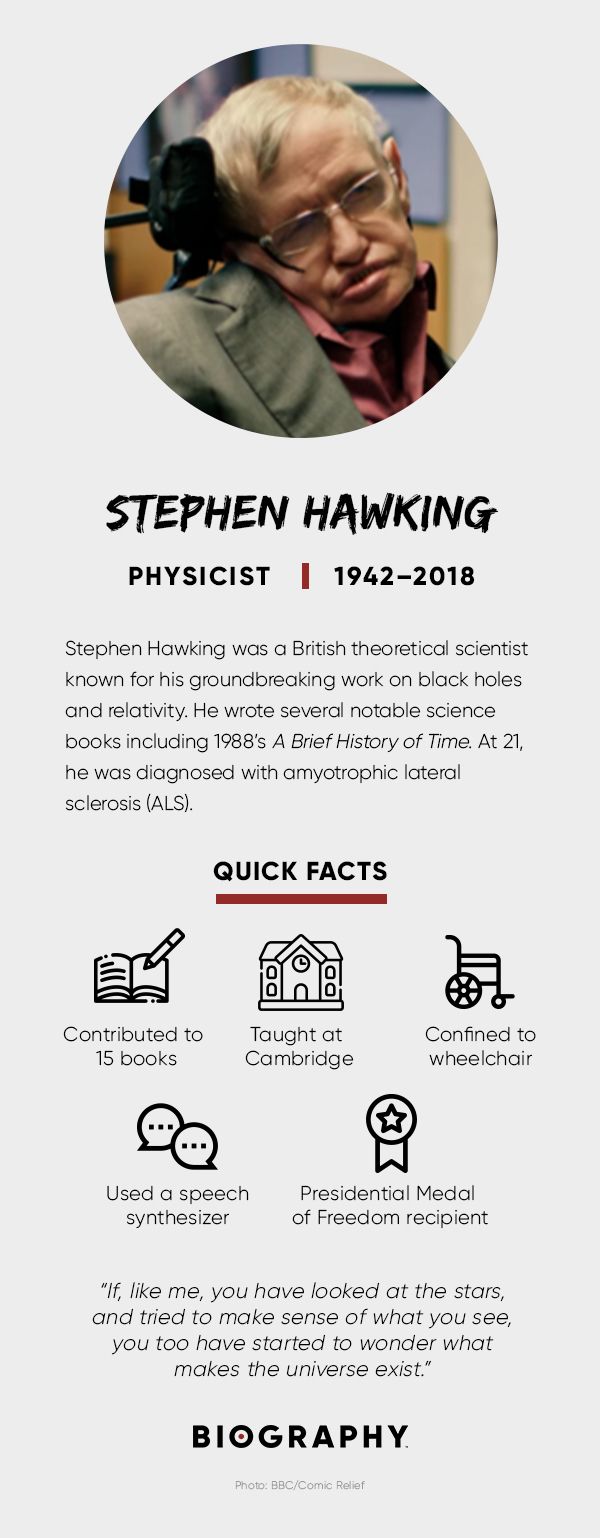
Wife and Children
At a New Year's party in 1963, Hawking met a young languages undergraduate named Jane Wilde. They were married in 1965. The couple gave birth to a son, Robert, in 1967, and a daughter, Lucy, in 1970. A third child, Timothy, arrived in 1979.
In 1990, Hawking left his wife Jane for one of his nurses, Elaine Mason. The two were married in 1995. The marriage put a strain on Hawking's relationship with his own children, who claimed Elaine closed off their father from them.
In 2003, nurses looking after Hawking reported their suspicions to police that Elaine was physically abusing her husband. Hawking denied the allegations, and the police investigation was called off. In 2006, Hawking and Elaine filed for divorce.
In the following years, the physicist reportedly grew closer to his family. He reconciled with Jane, who had remarried. And he published five science-themed novels for children with his daughter, Lucy.
Stephen Hawking: Books
Over the years, Hawking wrote or co-wrote a total of 15 books. A few of the most noteworthy include:
'A Brief History of Time'
In 1988 Hawking catapulted to international prominence with the publication of A Brief History of Time . The short, informative book became an account of cosmology for the masses and offered an overview of space and time, the existence of God and the future.
The work was an instant success, spending more than four years atop the London Sunday Times' best-seller list. Since its publication, it has sold millions of copies worldwide and been translated into more than 40 languages.
‘The Universe in a Nutshell’
A Brief History of Time also wasn't as easy to understand as some had hoped. So in 2001, Hawking followed up his book with The Universe in a Nutshell , which offered a more illustrated guide to cosmology's big theories.
‘A Briefer History of Time’
In 2005, Hawking authored the even more accessible A Briefer History of Time , which further simplified the original work's core concepts and touched upon the newest developments in the field like string theory.
Together these three books, along with Hawking's own research and papers, articulated the physicist's personal search for science's Holy Grail: a single unifying theory that can combine cosmology (the study of the big) with quantum mechanics (the study of the small) to explain how the universe began.
This kind of ambitious thinking allowed Hawking, who claimed he could think in 11 dimensions, to lay out some big possibilities for humankind. He was convinced that time travel is possible, and that humans may indeed colonize other planets in the future.
‘The Grand Design’
In September 2010, Hawking spoke against the idea that God could have created the universe in his book The Grand Design . Hawking previously argued that belief in a creator could be compatible with modern scientific theories.
In this work, however, he concluded that the Big Bang was the inevitable consequence of the laws of physics and nothing more. "Because there is a law such as gravity, the universe can and will create itself from nothing," Hawking said. "Spontaneous creation is the reason there is something rather than nothing, why the universe exists, why we exist."
The Grand Design was Hawking's first major publication in almost a decade. Within his new work, Hawking set out to challenge Isaac Newton 's belief that the universe had to have been designed by God, simply because it could not have been born from chaos. "It is not necessary to invoke God to light the blue touch paper and set the universe going," Hawking said.
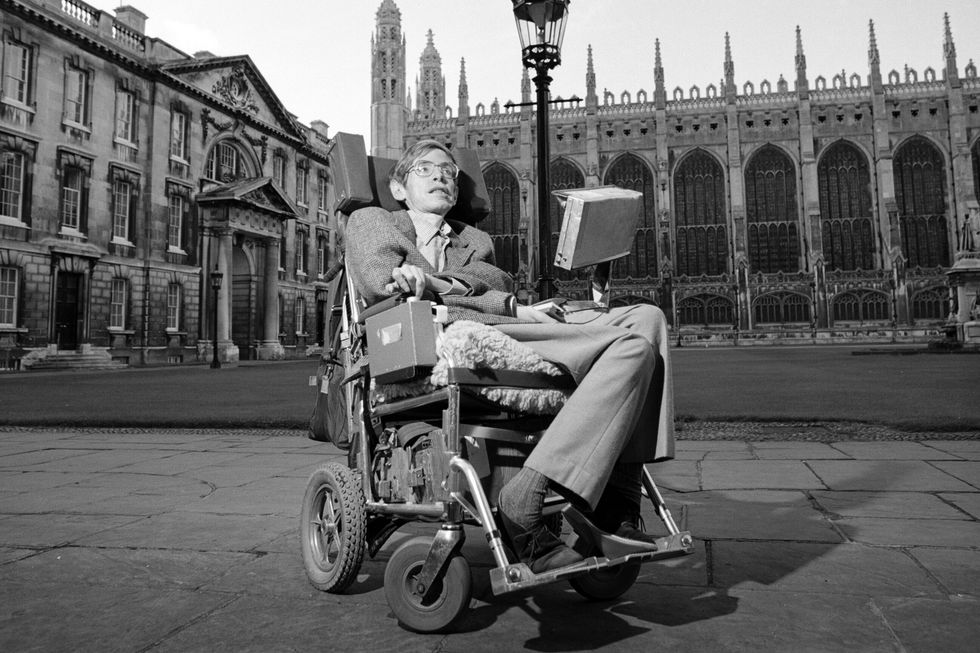
At the age of 21, Hawking was diagnosed with amyotrophic lateral sclerosis (ALS, or Lou Gehrig 's disease). In a very simple sense, the nerves that controlled his muscles were shutting down. At the time, doctors gave him two and a half years to live.
Hawking first began to notice problems with his physical health while he was at Oxford — on occasion he would trip and fall, or slur his speech — but he didn't look into the problem until 1963, during his first year at Cambridge. For the most part, Hawking had kept these symptoms to himself.
But when his father took notice of the condition, he took Hawking to see a doctor. For the next two weeks, the 21-year-old college student made his home at a medical clinic, where he underwent a series of tests.
"They took a muscle sample from my arm, stuck electrodes into me, and injected some radio-opaque fluid into my spine, and watched it going up and down with X-rays, as they tilted the bed," he once said. "After all that, they didn't tell me what I had, except that it was not multiple sclerosis, and that I was an atypical case."
Eventually, however, doctors did diagnose Hawking with the early stages of ALS. It was devastating news for him and his family, but a few events prevented him from becoming completely despondent.
The first of these came while Hawking was still in the hospital. There, he shared a room with a boy suffering from leukemia. Relative to what his roommate was going through, Hawking later reflected, his situation seemed more tolerable.
Not long after he was released from the hospital, Hawking had a dream that he was going to be executed. He said this dream made him realize that there were still things to do with his life.
In a sense, Hawking's disease helped turn him into the noted scientist he became. Before the diagnosis, Hawking hadn't always focused on his studies. "Before my condition was diagnosed, I had been very bored with life," he said. "There had not seemed to be anything worth doing."
With the sudden realization that he might not even live long enough to earn his Ph.D., Hawking poured himself into his work and research.
As physical control over his body diminished (he'd be forced to use a wheelchair by 1969), the effects of his disease started to slow down. Over time, however, Hawking's ever-expanding career was accompanied by an ever-worsening physical state.
How Did Stephen Hawking Talk?
By the mid-1970s, the Hawking family had taken in one of Hawking's graduate students to help manage his care and work. He could still feed himself and get out of bed, but virtually everything else required assistance.
In addition, his speech had become increasingly slurred, so that only those who knew him well could understand him. In 1985 he lost his voice for good following a tracheotomy. The resulting situation required 24-hour nursing care for the acclaimed physicist.
It also put in peril Hawking's ability to do his work. The predicament caught the attention of a California computer programmer, who had developed a speaking program that could be directed by head or eye movement. The invention allowed Hawking to select words on a computer screen that were then passed through a speech synthesizer.
At the time of its introduction, Hawking, who still had use of his fingers, selected his words with a handheld clicker. Eventually, with virtually all control of his body gone, Hawking directed the program through a cheek muscle attached to a sensor.
Through the program, and the help of assistants, Hawking continued to write at a prolific rate. His work included numerous scientific papers, of course, but also information for the non-scientific community.
Hawking's health remained a constant concern—a worry that was heightened in 2009 when he failed to appear at a conference in Arizona because of a chest infection. In April, Hawking, who had already announced he was retiring after 30 years from the post of Lucasian Professor of Mathematics at Cambridge, was rushed to the hospital for being what university officials described as "gravely ill," though he later made a full recovery.
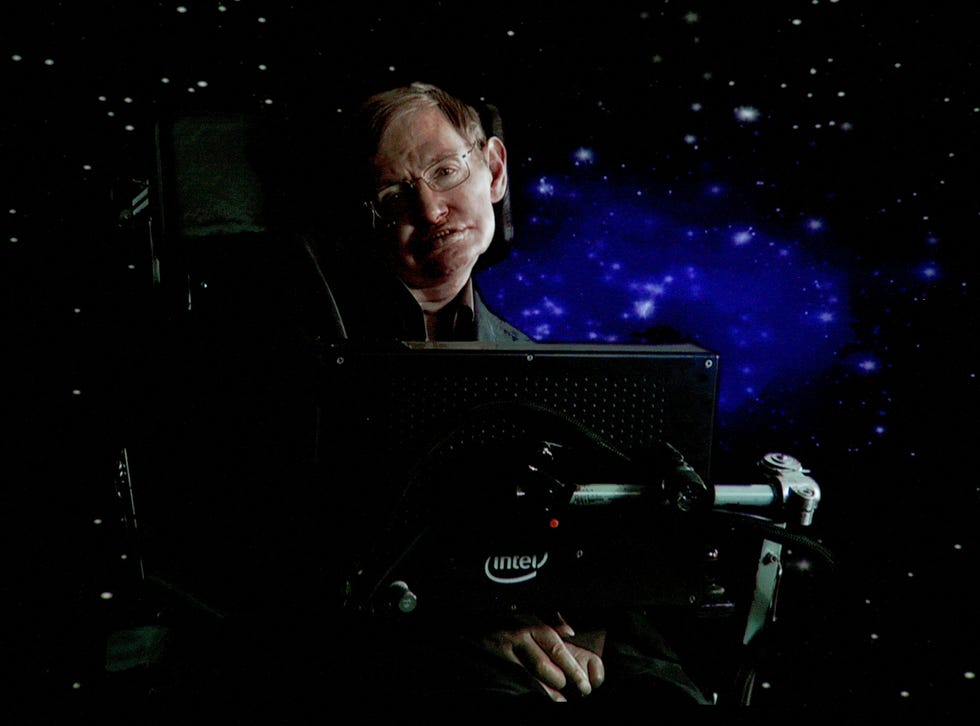
Research on the Universe and Black Holes
In 1974, Hawking's research turned him into a celebrity within the scientific world when he showed that black holes aren't the information vacuums that scientists had thought they were.
In simple terms, Hawking demonstrated that matter, in the form of radiation, can escape the gravitational force of a collapsed star. Another young cosmologist, Roger Penrose, had earlier discovered groundbreaking findings about the fate of stars and the creation of black holes, which tapped into Hawking's own fascination with how the universe began.
The pair then began working together to expand upon Penrose’s earlier work, setting Hawking on a career course marked by awards, notoriety and distinguished titles that reshaped the way the world thinks about black holes and the universe.
When Hawking’s radiation theory was born, the announcement sent shock waves of excitement through the scientific world. Hawking was named a fellow of the Royal Society at the age of 32, and later earned the prestigious Albert Einstein Award, among other honors. He also earned teaching stints at Caltech in Pasadena, California, where he served as visiting professor, and at Gonville and Caius College in Cambridge.
In August 2015, Hawking appeared at a conference in Sweden to discuss new theories about black holes and the vexing "information paradox." Addressing the issue of what becomes of an object that enters a black hole, Hawking proposed that information about the physical state of the object is stored in 2D form within an outer boundary known as the "event horizon." Noting that black holes "are not the eternal prisons they were once thought," he left open the possibility that the information could be released into another universe.
Beginning of the Universe
In a March 2018 interview on Neil deGrasse Tyson 's Star Talk , Hawking addressed the topic of "what was around before the Big Bang" by stating there was nothing around. He said by applying a Euclidean approach to quantum gravity, which replaces real time with imaginary time, the history of the universe becomes like a four-dimensional curved surface, with no boundary.
He suggested picturing this reality by thinking of imaginary time and real time as beginning at the Earth's South Pole, a point of space-time where the normal laws of physics hold; as there is nothing "south" of the South Pole, there was also nothing before the Big Bang.
Hawking and Space Travel
In 2007, at the age of 65, Hawking made an important step toward space travel. While visiting the Kennedy Space Center in Florida, he was given the opportunity to experience an environment without gravity.
Over the course of two hours over the Atlantic, Hawking, a passenger on a modified Boeing 727, was freed from his wheelchair to experience bursts of weightlessness. Pictures of the freely floating physicist splashed across newspapers around the globe.
"The zero-G part was wonderful, and the high-G part was no problem. I could have gone on and on. Space, here I come!" he said.
Hawking was scheduled to fly to the edge of space as one of Sir Richard Branson 's pioneer space tourists. He said in a 2007 statement, "Life on Earth is at the ever-increasing risk of being wiped out by a disaster, such as sudden global warming , nuclear war, a genetically engineered virus or other dangers. I think the human race has no future if it doesn't go into space. I therefore want to encourage public interest in space."
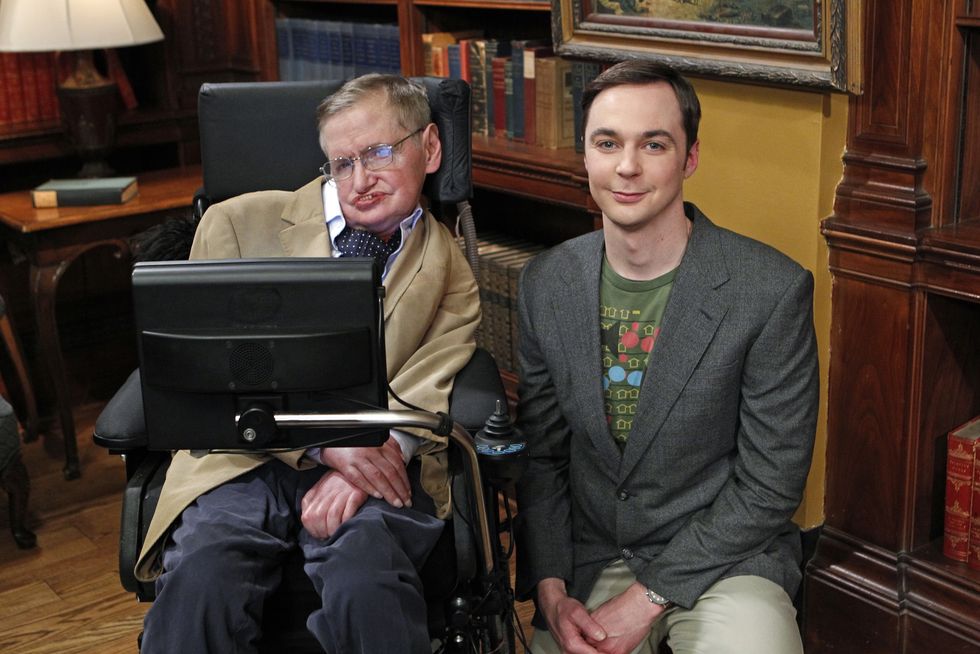
Stephen Hawking Movie and TV Appearances
If there is such a thing as a rock-star scientist, Hawking embodied it. His forays into popular culture included guest appearances on The Simpsons , Star Trek: The Next Generation , a comedy spoof with comedian Jim Carrey on Late Night with Conan O'Brien , and even a recorded voice-over on the Pink Floyd song "Keep Talking."
In 1992, Oscar-winning filmmaker Errol Morris released a documentary about Hawking's life, aptly titled A Brief History of Time . Other TV and movie appearances included:
'The Big Bang Theory'
In 2012, Hawking showed off his humorous side on American television, making a guest appearance on The Big Bang Theory . Playing himself on this popular comedy about a group of young, geeky scientists, Hawking brings the theoretical physicist Sheldon Cooper ( Jim Parsons ) back to Earth after finding an error in his work. Hawking earned kudos for this light-hearted effort.
'The Theory of Everything'
In November of 2014, a film about the life of Hawking and Jane Wilde was released. The Theory of Everything stars Eddie Redmayne as Hawking and encompasses his early life and school days, his courtship and marriage to Wilde, the progression of his crippling disease and his scientific triumphs.
In May 2016, Hawking hosted and narrated Genius , a six-part television series which enlists volunteers to tackle scientific questions that have been asked throughout history. In a statement regarding his series, Hawking said Genius is “a project that furthers my lifelong aim to bring science to the public. It’s a fun show that tries to find out if ordinary people are smart enough to think like the greatest minds who ever lived. Being an optimist, I think they will.”
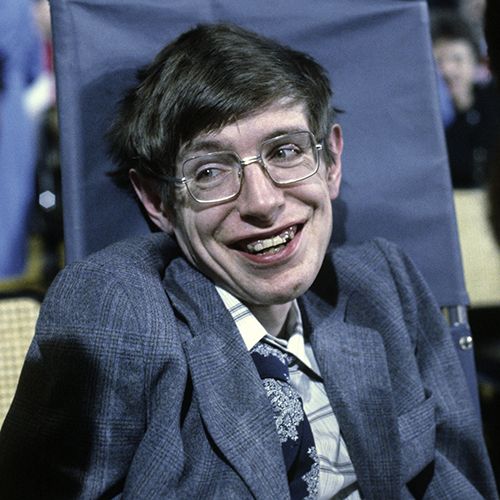
In 2011, Hawkings had participated in a trial of a new headband-styled device called the iBrain. The device is designed to "read" the wearer's thoughts by picking up "waves of electrical brain signals," which are then interpreted by a special algorithm, according to an article in The New York Times . This device could be a revolutionary aid to people with ALS.
Hawking on AI
In 2014, Hawking, among other top scientists, spoke out about the possible dangers of artificial intelligence, or AI, calling for more research to be done on all of possible ramifications of AI. Their comments were inspired by the Johnny Depp film Transcendence , which features a clash between humanity and technology.
"Success in creating AI would be the biggest event in human history," the scientists wrote. "Unfortunately, it might also be the last, unless we learn how to avoid the risks." The group warned of a time when this technology would be "outsmarting financial markets, out-inventing human researchers, out-manipulating human leaders, and developing weapons we cannot even understand."
Hawking reiterated this stance while speaking at a technology conference in Lisbon, Portugal, in November 2017. Noting how AI could potentially make gains in wiping out poverty and disease, but could also lead to such theoretically destructive actions as the development of autonomous weapons, he said, "We cannot know if we will be infinitely helped by AI, or ignored by it and sidelined, or conceivably destroyed by it."
Hawking and Aliens
In July 2015, Hawking held a news conference in London to announce the launch of a project called Breakthrough Listen. Funded by Russian entrepreneur Yuri Milner, Breakthrough Listen was created to devote more resources to the discovery of extraterrestrial life.
Breaking the Internet
In October 2017, Cambridge University posted Hawking's 1965 doctoral thesis, "Properties of Expanding Universes," to its website. An overwhelming demand for access promptly crashed the university server, though the document still fielded a staggering 60,000 views before the end of its first day online.
When Did Stephen Hawking Die?
On March 14, 2018, Hawking finally died of ALS, the disease that was supposed to have killed him more than 50 years earlier. A family spokesman confirmed that the iconic scientist died at his home in Cambridge, England.
The news touched many in his field and beyond. Fellow theoretical physicist and author Lawrence Krauss tweeted: "A star just went out in the cosmos. We have lost an amazing human being. Hawking fought and tamed the cosmos bravely for 76 years and taught us all something important about what it truly means to celebrate about being human."
Hawking's children followed with a statement: "We are deeply saddened that our beloved father passed away today. He was a great scientist and an extraordinary man whose work and legacy will live on for many years. His courage and persistence with his brilliance and humor inspired people across the world. He once said, 'It would not be much of a universe if it wasn’t home to the people you love.' We will miss him forever."
Later in the month, it was announced that Hawking's ashes would be interred at Westminster Abbey in London, alongside other scientific luminaries like Isaac Newton and Charles Darwin .
On May 2, 2018, his final paper, titled "A smooth exit from eternal inflation?" was published in the Journal of High Energy Physics . Submitted 10 days before his death, the new report, co-authored by Belgian physicist Thomas Hertog, disputes the idea that the universe will continue to expand.
QUICK FACTS
- Name: Stephen Hawking
- Birth Year: 1942
- Birth date: January 8, 1942
- Birth City: Oxford, England
- Birth Country: United Kingdom
- Gender: Male
- Best Known For: Stephen Hawking was a scientist known for his work with black holes and relativity, and the author of popular science books like 'A Brief History of Time.'
- Science and Medicine
- Astrological Sign: Capricorn
- University of Cambridge
- Gonville & Caius College
- Oxford University
- California Institute of Technology
- Interesting Facts
- As an author, Stephen Hawking was best known for his best seller 'A Brief History of Time.'
- At the age of 21, Stephen Hawking was diagnosed with amyotrophic lateral sclerosis (ALS, or Lou Gehrig's disease).
- Death Year: 2018
- Death date: March 14, 2018
- Death City: Cambridge, England
- Death Country: United Kingdom
We strive for accuracy and fairness. If you see something that doesn't look right , contact us !
- My goal is simple. It is a complete understanding of the universe, why it is as it is and why it exists at all.
- Not only does God definitely play dice, but He sometimes confuses us by throwing them where they can't be seen.
- Intelligence is the ability to adapt to change.
- Before my condition was diagnosed, I had been very bored with life. There had not seemed to be anything worth doing.
- I believe that life on Earth is at an ever increasing risk of being wiped out by a disaster such as sudden global warming, nuclear war, a genetically engineered virus, or other dangers. I think the human race has no future if it doesn't go into space.
- Because there is a law such as gravity, the universe can and will create itself from nothing. Spontaneous creation is the reason there is something rather than nothing, why the universe exists, why we exist.
- It is not necessary to invoke God to light the blue touch paper and set the universe going.
- It is not clear that intelligence has any long-term survival value.
- If, like me, you have looked at the stars, and tried to make sense of what you see, you too have started to wonder what makes the universe exist.
- I regard the brain as a computer which will stop working when its components fail. There is no heaven or afterlife for broken down computers; that is a fairy story for people afraid of the dark.
- Science is beautiful when it makes simple explanations of phenomena or connections between different observations. Examples include the double helix in biology, and the fundamental equations of physics.
- People who boast about their I.Q. are losers.
- We shouldn't be surprised that conditions in the universe are suitable for life, but this is not evidence that the universe was designed to allow for life. We could call order by the name of God, but it would be an impersonal God. There's not much personal about the laws of physics.
Famous British People

Anya Taylor-Joy

Kate Middleton, Princess of Wales

Kensington Palace Shares an Update on Kate

Amy Winehouse

Prince William

Where in the World Is Kate Middleton?
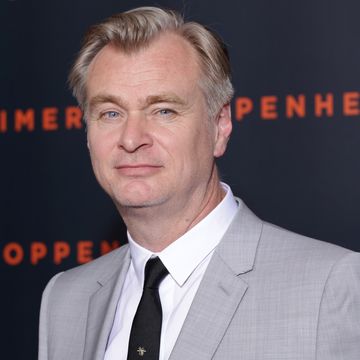
Christopher Nolan

Emily Blunt
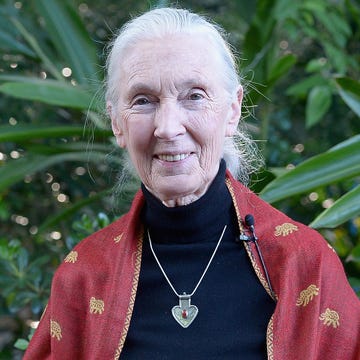
Jane Goodall

Princess Kate Is Seen for First Time Since Surgery

Stephen Hawking: A Prominent Scientist Essay (Biography)
Introduction.
Stephen Hawking was one of the most famous scientists of the modern era. His achievements in physics placed him in the same row as people like Einstein. Hawking mostly advanced theories associated with the universe and its development. Moreover, he put effort into popularizing science among people, and his findings became discussed even among individuals who have no understanding of complex physics. This paper describes the life of Stephen Hawking and his most important works.
The path of a scientist was determined for Stephen Hawking from the start. Being born in 1942 in a family of a tropical medicine researcher, he was influenced by his father to take this path (Mellors). However, he found biology vague and unspecific, so mathematics and physics became his choice. Being a talented young man, Hawking did not take much time to study since he could easily understand most of the information intuitively. However, this fact did not prevent him from receiving first-class honors in physics upon graduating from Oxford University in 1962 (Mellors). His primary interest at that time was the theory of relativity.
However, it was a cosmology that drew Hawking’s attention later in his life. This was the field he concentrated on during his post-graduate studies at Cambridge University, which he finished in 1966 with a doctorate (Mellors). Discovering the origins of the universe became the goal of his life, and eventually led him to develop some of the most outstanding theories in modern science. For example, Hawking introduced the concept of singularity as one of his earliest works (Mellors). He claimed that it is a place that can be situated in a black hole, where time, space, and matter act differently.
Stephen Hawking also had an interesting personality and a challenging life. During his university studies, he was diagnosed with ALS – a disease that made him lose the ability to move and speak in several decades (Mellors). However, it did not decrease his passion for work and life. He managed to lead a successful career, publish several non-fiction books about space science, and even married twice and had children (Mellors). Stephen Hawking died in 2018 but left many people inspired about cosmology and universe discovery.
Stephen Hawking was one of the most prominent physics scientists, who introduced some of the most important theories that are currently used in space exploration. Despite having a progressing disease influencing his activities, he led an active lifestyle and managed to make many people interested in this field. Hawking’s findings have completely changed the knowledge about the universe, making humankind one step closer to discovering its origins.
Mellors, Julie, editor. Gale Biography Presents: Scientists and Inventors . Gale Cengage Learning, 2018.
- Chicago (A-D)
- Chicago (N-B)
IvyPanda. (2022, June 2). Stephen Hawking: A Prominent Scientist. https://ivypanda.com/essays/stephen-hawking-a-prominent-scientist/
"Stephen Hawking: A Prominent Scientist." IvyPanda , 2 June 2022, ivypanda.com/essays/stephen-hawking-a-prominent-scientist/.
IvyPanda . (2022) 'Stephen Hawking: A Prominent Scientist'. 2 June.
IvyPanda . 2022. "Stephen Hawking: A Prominent Scientist." June 2, 2022. https://ivypanda.com/essays/stephen-hawking-a-prominent-scientist/.
1. IvyPanda . "Stephen Hawking: A Prominent Scientist." June 2, 2022. https://ivypanda.com/essays/stephen-hawking-a-prominent-scientist/.
Bibliography
IvyPanda . "Stephen Hawking: A Prominent Scientist." June 2, 2022. https://ivypanda.com/essays/stephen-hawking-a-prominent-scientist/.
- Stephen Hawking: Visionary and Cross-Cultural Leadership
- What Is Wrong With Rational Suicide?
- The Wonders of the Universe
- “The Elusive Theory of Everything”: Natural Sciences for Public
- The Tudor Phase of England’s Chronology: Elizabethan Age
- Artificial Intelligence and the Associated Threats
- Human Computer Interaction: Types of Special Needs
- Dangers of False Representation in Mathematics
- Science Integration Into Popular Culture: The Essence of Science in Popular Culture and Its Influence on Contemporary Society
- Science and Aviation Technology Effects on Society
- The Role of Napoleon Bonaparte in the French Revolution
- Napoleon Bonaparte and the Enlightenment
- Historical Figure in Social Work: Jane Addams
- Maria Rosa Henson, Ferdinand Marcos and Imelda Marcos: Three Prominent Filipinos
- Joan of Arc: The History of French Heroine
Thank you for visiting nature.com. You are using a browser version with limited support for CSS. To obtain the best experience, we recommend you use a more up to date browser (or turn off compatibility mode in Internet Explorer). In the meantime, to ensure continued support, we are displaying the site without styles and JavaScript.
- View all journals
- Explore content
- About the journal
- Publish with us
- Sign up for alerts
- 14 March 2018
Stephen Hawking (1942–2018)
- Martin Rees 0
Martin Rees is Astronomer Royal of the United Kingdom. He was a student in Dennis Sciama’s research group at the University of Cambridge at the same time as Stephen Hawking.
You can also search for this author in PubMed Google Scholar
You have full access to this article via your institution.
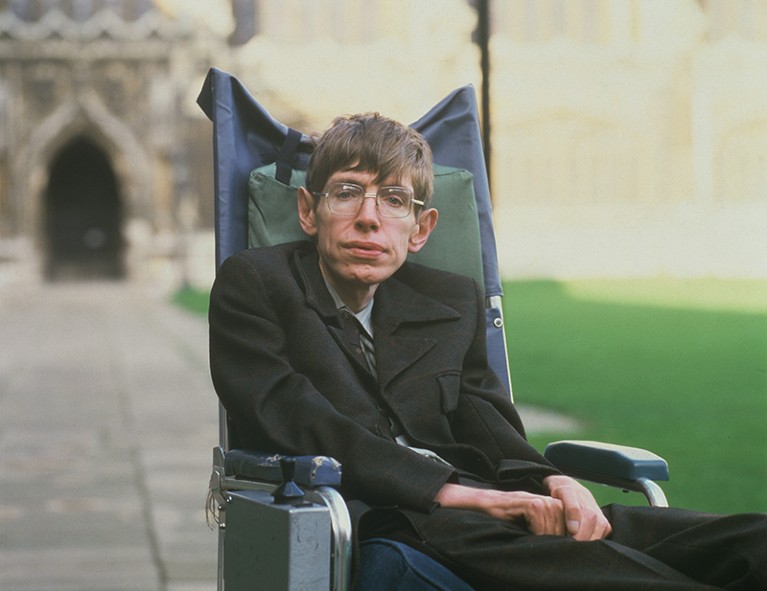
Stephen Hawking in Cambridge, January 1993. Credit: David Montgomery/Getty
When Stephen Hawking was diagnosed with motor-neuron disease at the age of 21, it wasn’t clear that he would finish his PhD. Against all expectations, he lived on for 55 years, becoming one of the world’s most celebrated scientists.
Hawking, who died on 14 March 2018, was born in Oxford, UK, in 1942 to a medical-researcher father and a philosophy-graduate mother. After attending St Albans School near London, he earned a first-class degree in physics from the University of Oxford. He began his research career in 1962, enrolling as a graduate student in a group at the University of Cambridge led by one of the fathers of modern cosmology, Dennis Sciama.
The general theory of relativity was at that time undergoing a renaissance, initiated in part by Roger Penrose at Birkbeck College, London, who had introduced new mathematical techniques. These showed that generic gravitational collapse would lead to singularities — infinities that signal the need for new physics.
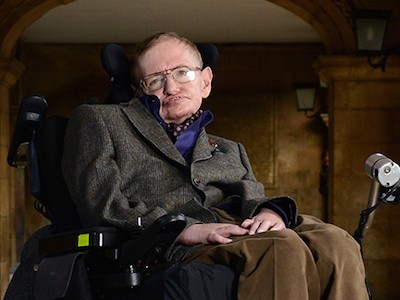
Stephen Hawking: A life in science
The implications for black holes and the Big Bang were developed by Hawking in a series of papers collated in the 1973 monograph The Large Scale Structure of Space-Time (Cambridge University Press), co-authored with George Ellis, a near-contemporary who had also been a student of Sciama. Especially important was the realization that the area of black holes’ horizons (‘one-way membranes’ that shroud the singularities, and from within which nothing can escape) could never decrease. The analogy with entropy — a measure of disorder that likewise can never decrease — was developed further by physicist Jacob Bekenstein.
These findings gained Hawking election to the Royal Society in London in 1974, at the age of 32. By then, he was so frail that both movement and speech were difficult, and most of us suspected that his days in front-line research were numbered. But in that same year, he came up with his most distinctive contribution to science: Hawking radiation.
By linking quantum theory and gravity, Hawking showed that a black hole would not be completely black, but would radiate with a well-defined temperature that depended inversely on its mass ( S. W. Hawking Nature 248, 30–31; 1974 ). Black-hole entropy was more than just an analogy. The implication was that the radiation would cause black holes to ‘evaporate’. This process would be unobservably slow, except in ‘mini-holes’ the size of atoms — and these are thought not to exist. Yet Hawking radiation — and the related issue of whether information that falls into a black hole is lost or is somehow recoverable from the radiation — was a profound issue, and one that still engenders controversy among theoretical physicists. Indeed, theorist Andrew Strominger at Harvard University in Cambridge, Massachusetts, said in 2016 that one of Hawking’s papers on the subject ( S. W. Hawking Phys. Rev. D 14, 2460–2473; 1976 ) had caused “more sleepless nights among theoretical physicists than any paper in history”.
By the end of the 1970s, Hawking had been appointed to the Lucasian Chair of Mathematics at Cambridge (former incumbents include Isaac Newton and Paul Dirac); he held the post until he retired in 2009. During these years, in which his focus shifted to the quantum aspects of the Big Bang, the issue of information loss in black holes continued to challenge him.
In 1985, Stephen underwent a tracheotomy, which removed his already limited powers of speech. He was able to control a cursor on a screen and type out sentences — albeit with increasingly painful slowness (first with his hand, and eventually only with a cheek muscle). A speech synthesizer processed his words and generated the androidal accent that became his trademark. In this way, he completed his best-selling book A Brief History of Time (Bantam, 1988), which propelled him to celebrity status.
Had Hawking achieved equal distinction in any other branch of science besides cosmology, it probably would not have had the same resonance with a worldwide public. As I put it in The Telegraph newspaper in 2007, “the concept of an imprisoned mind roaming the cosmos” grabbed people’s imagination.
In 1965, Stephen married Jane Wilde. After 25 years of marriage, and three children, the strain of Stephen’s illness and of sharing their home with a team of nurses became too much and they separated, divorcing in 1995. Jane wrote a book about their life together, Travelling to Infinity (Alma, 2008), and both she and Stephen were happy with the telling of their story in the 2014 film The Theory of Everything (although it elides and conflates Stephen’s science). After a second, briefer marriage, Stephen was supported by an entourage of assistants, as well as his family.
Stephen remained remarkably positive throughout his life, despite the immense frustration that his condition clearly caused. He enjoyed theatre and opera trips, and he seemed energized rather than exhausted by his travels to all parts of the world, as well as by his regular trips to the California Institute of Technology in Pasadena. He retained robust common sense and a sense of humour, expressed forceful opinions, supported political causes and was happy to engage with the media, despite its insistent attention. His comments gained outsized attention even on subjects in which he was not a specialist, such as philosophy and the dangers of artificial intelligence.
Stephen’s expectations when he was diagnosed dropped to zero; he said that everything that had happened since had been a bonus. And what a bonus — for physics, for the millions enlightened by his books and for the even larger number inspired by his achievement against all the odds.
Nature 555 , 444 (2018)
doi: https://doi.org/10.1038/d41586-018-02839-9
Related Articles

‘Best view ever’: observatory will map Big Bang’s afterglow in new detail
News 22 MAR 24

Do black holes explode? The 50-year-old puzzle that challenges quantum physics
Muse 14 MAR 24

How dwarf galaxies lit up the Universe after the Big Bang
News 28 FEB 24

Heat flows enrich prebiotic building blocks and enhance their reactivity
Article 03 APR 24

An optical tweezer array of ultracold polyatomic molecules

A quirky fluid that has robotic capabilities
News & Views 03 APR 24
Faculty Positions, Aging and Neurodegeneration, Westlake Laboratory of Life Sciences and Biomedicine
Applicants with expertise in aging and neurodegeneration and related areas are particularly encouraged to apply.
Hangzhou, Zhejiang, China
Westlake Laboratory of Life Sciences and Biomedicine (WLLSB)
Faculty Positions in Chemical Biology, Westlake University
We are seeking outstanding scientists to lead vigorous independent research programs focusing on all aspects of chemical biology including...
School of Life Sciences, Westlake University
Faculty Positions in Neurobiology, Westlake University
We seek exceptional candidates to lead vigorous independent research programs working in any area of neurobiology.

Seeking Global Talents, the International School of Medicine, Zhejiang University
Welcome to apply for all levels of professors based at the International School of Medicine, Zhejiang University.
Yiwu, Zhejiang, China
International School of Medicine, Zhejiang University
Nanjing Forestry University is globally seeking Metasequoia Scholars and Metasequoia Talents
Located next to Purple Mountain and Xuanwu Lake, Nanjing Forestry University (NJFU) is a key provincial university jointly built by Jiangsu Province
Nanjing, Jiangsu, China
Nanjing Forestry University (NFU)
Sign up for the Nature Briefing newsletter — what matters in science, free to your inbox daily.
Quick links
- Explore articles by subject
- Guide to authors
- Editorial policies
Subscribe to this podcast
Listen&Learn: Stephen Hawking

Pre-listening vocabulary
- physicist: a scientist who studies physics
- diagnose: to identify an illness by studying a person’s symptoms
- condition: a medical issue
- black hole: a region of space where gravity is so strong that nothing can escape
- speech synthesizer: a machine used to produce human speech
Listening activity
Podcast: Play in new window | Download (Duration: 1:26 — 1.3MB)
Subscribe: Apple Podcasts | More
Gapfill exercise
Comprehension questions, discussion/essay questions.
- Stephen Hawking once had a party for time travellers. He didn’t send the invitations out until the day after the party, so that only people from the future could show up. It was an experiment that was meant to show that time travel to the past was unlikely to be possible. Do you think that time travel could ever be possible? Why or why not?
Stephen Hawking was an English physicist. He was born in 1942 in Oxford, England. Growing up, Hawking was always very interested in math and science, and at age 17, he decided to pursue a physics degree. However, at age 21, Hawking was diagnosed with ALS, a serious condition that weakens nerves and muscles. His doctor didn’t expect him to live more than two years after his diagnosis, but Hawking was determined to get his degree. He achieved his goal, and he is now well-known for his research on black holes. Throughout his life, he also published several books about the universe. His most famous book, titled A Brief History of Time, was written to help ordinary people understand complex scientific concepts. Hawking lived much longer than expected, but his condition worsened as his life went on. Eventually, he had to use a wheelchair to move around, and a speech synthesizer to communicate. Hawking died at the age of 76, after living a full and accomplished life.
20 comments
With my amyotrophic lateral sclerosis (ALS), the first thing that happened almost 2 years ago now, was speaking as if I were drunk. I wasn’t. I initially did improve speech (articulating clearly but slow) but now I can no longer speak in an acceptable way. Then, a year later eating became problematic, I was biting my tongue and lips, and chewing became weak and less controlled. Soon after that some fingers started to fail me and things would drop out of my hands. Somewhere at that time bulbar ALS was diagnosed. The Rilutek (riluzole) did very little to help me. The medical team did even less. My decline was rapid and devastating.. We tried every shot available but nothing was working. There has been little if any progress in finding a reliable treatment, Our care provider introduced us to Kycuyu Health Clinic ALS/MND herbal treatment.
Very interested and easy
People who are not born will disappear
No, Time-Travelling is not possible. If humans try to make one, I am sure it will take at least 100 years. Even if they succeed to make one, it is against Nature’s Law. And, it won’t always work properly. If it goes wrong, the person who traveled will be the reason for many people’s disappearance as the person is stuck in the time, Dead will become alive and people whose relatives are dead will become alive, and people who are born in that year will disappear.
I found this lesson very helpful to improve my English conversation
No, I don’t think it’s possible. Once I read a theory that says Spacetime is a single four-dimensional manifold; so we cann’t travel to the past because would have to decrease the space that already exists, and we can’t travel to future because that space doesn’t exist at this moment.
Sure,I believe it can be possible.because we already known about parallel universe.maybe just a little bit.
A good article for learning English and also an inspiring story for self improvement.
It is a easy and pretty text about a great scientist.
A short history about Stephen Hawking, but the reader can make himself an idea, who was this famous and important scientific.
A short history about Stephen Hawking, but the reader can make himself a idea, who was this scientific.
Awesome! Very helpful in my process of listening and writing . thank you.
Your exercise is so much good
It was very useful. Thank you so much for this exercise
Very useful
How was a great spirit for struggling.
good morning
I find this dynamic excellent, it is helping me a lot for my learning in the part of reading, listening and reading comprehension
wonderful!!
Leave a comment
Email * (not published)
- Scientific Methods
- Famous Physicists
- Stephen Hawking
Stephen William Hawking
Stephen Hawking is one of the most precious gems in the world of physics, who was ahead of his time. His disability of having unsteady feet and being diagnosed with degenerative disease couldn’t stop Stephen Hawking from becoming the world’s most famous and acclaimed scientist. Even his survival would have been a marvel to this world, but he lived amazingly till 76.
Table of Contents
- Who was Stephen Hawking?
- Stephen Hawking’s Education Awards & Achievements
- The Black Hole Theory
The Big Bang
Hawking radiation, the multiverse, who was stephen william hawking.
Stephen William Hawking was a British physicist, born on 8th January 1942. He is considered the most brilliant theoretical physicist of all time. He revolutionized the field of physics through his work on the origin of the universe and the black hole explosion theory. From the big bang to black holes, all his best-selling books appealed to physics lovers across the globe.
The English theoretical physicist whose theory of the explosion of black holes illustrated upon the theory of relativity and quantum mechanics. He also worked in the field of space-time singularities.

Stephen Hawking’s Education Awards & Achievements
Stephen William Hawking studied physics in 1962 at the University College, Cambridge and in 1966 in the Trinity Hall, Cambridge,. His contributions in physics are unparalleled, which often left other scientists scratching their heads.
Professor Stephen William Hawking holds 13 honorary degrees. He was bestowed CBE (1982), Fellow of Honor (1989) and the Presidential Medal of Freedom (2009).
He has received the Fundamental Physics Award (2013), the Copley Medal (2006) and the Wolf Foundation Award (1988). Along with a bunch of other honours awards and medals, he won the Adams Prize in 1966 for his essay Singularities and the Space-time Geometry.
He was also a member of the Royal Society, the National Academy of Sciences of the United States and the Pontifical Academy of Sciences.
The physics of black hole.
Stephen William Hawking’s name has always been associated with the black hole. He put forward his stroke of genius combining Einstein’s Theory of Relativity , which has already aroused curiosity and has been under debate for decades, and the theory of quantum mechanics. In the early 1970s, Hawkins turned his attention to both of these theories, and later on, Stephen William Hawking’s most famous thesis on black holes was proven right.
Hawking’s doctoral thesis was written at a critical time when there was an argument between two cosmological theories: the Big Bang theory and the Steady State theory. Both these theories were considered to be opposing each other at that time. However, both theories accepted that the universe is expanding, but the first one explains that the universe is expanding from an ultra-compact, super-dense state at a finite time in the past, and the second one assumes that the universe has been intensifying forever.
Hawking showed in his thesis that the Steady State theory is mathematically self-contradictory. He reasoned instead that the universe began as a dense point called a singularity which was infinitely small. His description has been accepted worldwide today.
The photons or the particles of light can’t escape from the black holes because of their intense and strong gravity. But Stephen Hawking argued on it, explaining the truth, which was more complex than the assumed fact. He applied quantum theory, especially the idea of “virtual photons”; he realized that some of these photons could appear to be radiated from the black hole . At a laboratory experiment in the Technion-Israel Institute of Technology, it has recently been confirmed that this theory is correct and is named Hawking Radiation.
Instead of a real black hole, the researchers used a “sonic black hole” from which sound waves cannot outflow.
Stephen Hawking was also involved in the most exciting topics toward the conclusion of his life was the multiverse theory. He proposed the idea that our universe, with its start in the Big Bang, is just one of an infinite number of contemporaneous bubble universes. In his very last paper in 2018, he proposed a novel mathematical framework and tried to seek out the universe in his own words. But as with any assumption concerning parallel universes, we do not have any idea if his ideas are right now. Maybe the scientists will be able to test his belief in the coming times.
Not only an amazing physicist but Stephen Hawking was an amazing and inspiring personality too, he left behind his great research theories and thoughts as his legacy to us, which is truly a gift in physics.
Stay tuned to BYJU’S for more such interesting articles. Also, register to “BYJU’S – The Learning App” for loads of interactive, engaging Physics-related videos and unlimited academic assistance.
Frequently Asked Questions
What stephen hawking is famous for.
Apart from one of the most brilliant British physicists Stephen Hawking is famous for his theories on the Big Bang and the black hole concept.
What is Stephen Hawking’s IQ
Stephen Hawking has tried to keep his IQ a secret but it was estimated that his IQ is around 160.
When did Stephen Hawking write his first book?
In 1973 Stephen Hawking wrote his first book which is named as “The Large Scale Structure of Space-TIme”
How many types of Black holes are there?
There are four types of black holes:
- Intermediate
- Supermassive
What is Big Bang Theory?
The Big Bang theory is the prevailing cosmological model explaining the existence of the observable universe from the earliest known periods through its subsequent large-scale evolution.
Leave a Comment Cancel reply
Your Mobile number and Email id will not be published. Required fields are marked *
Request OTP on Voice Call
Post My Comment
Knowledgable & inspiring.
- Share Share
Register with BYJU'S & Download Free PDFs
Register with byju's & watch live videos.

Advertisement
Comment and Physics
A brief history of stephen hawking: a legacy of paradox.
By Stuart Clark
14 March 2018

Gemma Levine/Getty
Stephen Hawking, the world-famous theoretical physicist, has died at the age of 76.
Hawking’s children, Lucy, Robert and Tim said in a statement: “We are deeply saddened that our beloved father passed away today.
“He was a great scientist and an extraordinary man whose work and legacy will live on for many years. His courage and persistence with his brilliance and humour inspired people across the world.
“He once said: ‘It would not be much of a universe if it wasn’t home to the people you love.’ We will miss him for ever.”
Stephen Hawking dies aged 76
Tributes flow in following the death of world-famous theoretical physicist stephen hawking.
The most recognisable scientist of our age, Hawking holds an iconic status. His genre-defining book, A Brief History of Time , has sold more than 10 million copies since its publication in 1988, and has been translated into more than 35 languages. He appeared on Star Trek: The Next Generation , The Simpsons and The Big Bang Theory . His early life was the subject of an Oscar-winning performance by Eddie Redmayne in the 2014 film The Theory of Everything . He was routinely consulted for oracular pronouncements on everything from time travel and alien life to Middle Eastern politics and nefarious robots . He had an endearing sense of humour and a daredevil attitude – relatable human traits that, combined with his seemingly superhuman mind, made Hawking eminently marketable.
But his cultural status – amplified by his disability and the media storm it invoked – often overshadowed his scientific legacy. That’s a shame for the man who discovered what might prove to be the key clue to the theory of everything , advanced our understanding of space and time, helped shape the course of physics for the last four decades and whose insight continues to drive progress in fundamental physics today.
Beginning with the big bang
Hawking’s research career began with disappointment. Arriving at the University of Cambridge in 1962 to begin his PhD, he was told that Fred Hoyle , his chosen supervisor, already had a full complement of students. The most famous British astrophysicist at the time, Hoyle was a magnet for the more ambitious students. Hawking didn’t make the cut. Instead, he was to work with Dennis Sciama, a physicist Hawking knew nothing about. In the same year, Hawking was diagnosed with amyotrophic lateral sclerosis, a degenerative motor neurone disease that quickly robs people of the ability to voluntarily move their muscles. He was told he had two years to live.
Although Hawking’s body may have weakened, his intellect stayed sharp. Two years into his PhD, he was having trouble walking and talking, but it was clear that the disease was progressing more slowly than the doctors had initially feared. Meanwhile, his engagement to Jane Wilde – with whom he later had three children, Robert, Lucy and Tim – renewed his drive to make real progress in physics.

Stephen and Lucy Hawking
James Veysey/Camera Press
Working with Sciama had its advantages. Hoyle’s fame meant that he was seldom in the department, whereas Sciama was around and eager to talk. Those discussions stimulated the young Hawking to pursue his own scientific vision. Hoyle was vehemently opposed to the big bang theory (in fact, he had coined the name “big bang” in mockery). Sciama, on the other hand, was happy for Hawking to investigate the beginning of time.
Time’s arrow
Hawking was studying the work of Roger Penrose , which proved that if Einstein’s general theory of relativity is correct, at the heart of every black hole must be a point where space and time themselves break down – a singularity. Hawking realised that if time’s arrow were reversed, the same reasoning would hold true for the universe as a whole. Under Sciama’s encouragement, he worked out the maths and was able to prove it: the universe according to general relativity began in a singularity.
Hawking was well aware, however, that Einstein didn’t have the last word. General relativity, which describes space and time on a large scale, doesn’t take into account quantum mechanics , which describes matter’s strange behaviour at much smaller scales. Some unknown “theory of everything” was needed to unite the two. For Hawking, the singularity at the universe’s origin did not signal the breakdown of space and time; it signalled the need for quantum gravity .
Luckily, the link that he forged between Penrose’s singularity and the singularity at the big bang provided a key clue for finding such a theory. If physicists wanted to understand the origin of the universe, Hawking had just shown them exactly where to look: a black hole .
Black holes were a subject ripe for investigation in the early 1970s. Although Karl Schwarzschild had found such objects lurking in the equations of general relativity back in 1915, theoreticians viewed them as mere mathematical anomalies and were reluctant to believe they could actually exist.
Albeit frightening, their action is reasonably straightforward: black holes have such strong gravitational fields that nothing, not even light, can escape their grip. Any matter that falls into one is forever lost to the outside world. This, however, is a dagger in the heart of thermodynamics.
Stephen Hawking's final theorem turns time and causality inside out
In his final years, Stephen Hawking tackled the question of why the universe appears fine-tuned for life. His collaborator Thomas Hertog explains the radical solution they came up with
Thermodynamic threat
The second law of thermodynamics is one of the most well-established laws of nature. It states that the entropy, or level of disorder in a system, always increases. The second law gives form to the observation that ice cubes will melt into a puddle, but a puddle of water will never spontaneously turn into a block of ice. All matter contains entropy, so what happens when it is dropped into a black hole? Is entropy lost along with it? If so, the total entropy of the universe goes down and black holes would violate the second law of thermodynamics.
Hawking thought that this was fine. He was happy to discard any concept that stood in the way to a deeper truth. And if that meant the second law, then so be it.
Bekenstein and breakthrough
But Hawking met his match at a 1972 physics summer school in the French ski resort of Les Houches, France. Princeton University graduate student Jacob Bekenstein thought that the second law of thermodynamics should apply to black holes too. Bekenstein had been studying the entropy problem and had reached a possible solution thanks to an earlier insight of Hawking’s .
A black hole hides its singularity with a boundary known as the event horizon. Nothing that crosses the event horizon can ever return to the outside. Hawking’s work had shown that the area of a black hole’s event horizon never decreases over time. What’s more, when matter falls into a black hole, the area of its event horizon grows.
Bekenstein realised this was key to the entropy problem. Every time a black hole swallows matter, its entropy appears to be lost, and at the same time, its event horizon grows. So, Bekenstein suggested, what if – to preserve the second law – the area of the horizon is itself a measure of entropy?
Hawking immediately disliked the idea and was angry that his own work had been used in support of a concept so flawed. With entropy comes heat, but the black hole couldn’t be radiating heat – nothing can escape its pull of gravity. During a break from the lectures, Hawking got together with colleagues Brandon Carter, who also studied under Sciama, and James Bardeen, of the University of Washington, and confronted Bekenstein.
The disagreement bothered Bekenstein. “These three were senior people. I was just out of my PhD. You worry whether you are just stupid and these guys know the truth,” he recalls.
Back in Cambridge, Hawking set out to prove Bekenstein wrong. Instead, he discovered the precise form of the mathematical relationship between entropy and the black hole’s horizon. Rather than destroying the idea, he had confirmed it. It was Hawking’s greatest breakthrough.
Hawking radiation
Hawking now embraced the idea that thermodynamics played a part in black holes. Anything that has entropy, he reasoned, also has a temperature – and anything that has a temperature can radiate.
His original mistake, Hawking realised, was in only considering general relativity, which says that nothing – no particles, no heat – can escape the grip of a black hole. That changes when quantum mechanics comes into play. According to quantum mechanics, fleeting pairs of particles and antiparticles are constantly appearing out of empty space, only to annihilate and disappear in the blink of an eye. When this happens in the vicinity of an event horizon, a particle-antiparticle pair can be separated – one falls behind the horizon while one escapes, leaving them forever unable to meet and annihilate. The orphaned particles stream away from the black hole’s edge as radiation. The randomness of quantum creation becomes the randomness of heat.
“I think most physicists would agree that Hawking’s greatest contribution is the prediction that black holes emit radiation,” says Sean Carroll , a theoretical physicist at the California Institute of Technology. “While we still don’t have experimental confirmation that Hawking’s prediction is true, nearly every expert believes he was right.”
Experiments to test Hawking’s prediction are so difficult because the more massive a black hole is, the lower its temperature. For a large black hole – the kind astronomers can study with a telescope – the temperature of the radiation is too insignificant to measure. As Hawking himself often noted, it was for this reason that he was never awarded a Nobel Prize. Still, the prediction was enough to secure him a prime place in the annals of science, and the quantum particles that stream from the black hole’s edge would forever be known as Hawking radiation .
Some have suggested that they should more appropriately be called Bekenstein-Hawking radiation, but Bekenstein himself rejects this. “The entropy of a black hole is called Bekenstein-Hawking entropy, which I think is fine. I wrote it down first, Hawking found the numerical value of the constant, so together we found the formula as it is today. The radiation was really Hawking’s work. I had no idea how a black hole could radiate. Hawking brought that out very clearly. So that should be called Hawking radiation.”
Theory of everything
The Bekenstein-Hawking entropy equation is the one Hawking asked to have engraved on his tombstone. It represents the ultimate mash-up of physical disciplines because it contains Newton’s constant, which clearly relates to gravity; Planck’s constant, which betrays quantum mechanics at play; the speed of light, the talisman of Einstein’s relativity; and the Boltzmann constant, the herald of thermodynamics.
The presence of these diverse constants hinted at a theory of everything, in which all physics is unified. Furthermore, it strongly corroborated Hawking’s original hunch that understanding black holes would be key in unlocking that deeper theory.
Hawking’s breakthrough may have solved the entropy problem, but it raised an even more difficult problem in its wake. If black holes can radiate, they will eventually evaporate and disappear. So what happens to all the information that fell in? Does it vanish too? If so, it will violate a central tenet of quantum mechanics. On the other hand, if it escapes from the black hole, it will violate Einstein’s theory of relativity. With the discovery of black hole radiation, Hawking had pit the ultimate laws of physics against one another. The black hole information loss paradox had been born.
Hawking staked his position in another ground-breaking and even more contentious paper entitled Breakdown of predictability in gravitational collapse, published in Physical Review D in 1976. He argued that when a black hole radiates away its mass, it does take all of its information with it – despite the fact that quantum mechanics expressly forbids information loss. Soon other physicists would pick sides, for or against this idea, in a debate that continues to this day. Indeed, many feel that information loss is the most pressing obstacle in understanding quantum gravity.
“Hawking’s 1976 argument that black holes lose information is a towering achievement, perhaps one of the most consequential discoveries on the theoretical side of physics since the subject was invented,” says Raphael Bousso of the University of California, Berkeley.
By the late 1990s, results emerging from string theory had most theoretical physicists convinced that Hawking was wrong about information loss, but Hawking, known for his stubbornness, dug in his heels. It wasn’t until 2004 that he would change his mind. And he did it with flair – dramatically showing up at a conference in Dublin and announcing his updated view : black holes cannot lose information.
Today, however, a new paradox known as the firewall has thrown everything into doubt (see “Hawking’s paradox”, below). It is clear that the question Hawking raised is at the core of the quest for quantum gravity.
“Black hole radiation raises serious puzzles we are still working very hard to understand,” says Carroll . “It’s fair to say that Hawking radiation is the single biggest clue we have to the ultimate reconciliation of quantum mechanics and gravity, arguably the greatest challenge facing theoretical physics today.”
Hawking’s legacy, says Bousso, will be “having put his finger on the key difficulty in the search for a theory of everything”.
Hawking continued pushing the boundaries of theoretical physics at a seemingly impossible pace for the rest of his life. He made important inroads towards understanding how quantum mechanics applies to the universe as a whole, leading the way in the field known as quantum cosmology. His progressive disease pushed him to tackle problems in novel ways, which contributed to his remarkable intuition for his subject. As he lost the ability to write out long, complicated equations, Hawking found new and inventive methods to solve problems in his head, usually by reimagining them in geometric form. But, like Einstein before him, Hawking never produced anything quite as revolutionary as his early work.
“Hawking’s most influential work was done in the 1970s, when he was younger,” says Carroll, “but that’s completely standard even for physicists who aren’t burdened with a debilitating neurone disease.”
Stephen Hawking's black hole paradox may finally have a solution
Black holes may not destroy all information about what they were originally made of, according to a new set of quantum calculations, which would solve a major physics paradox first described by Stephen Hawking
Hawking the superstar

In the meantime, the publication of A Brief History of Time catapulted Hawking to cultural stardom and gave a fresh face to theoretical physics. He never seemed to mind. “In front of the camera, Hawking played the character of Hawking. He seemed to play with his cultural status,” says Hélène Mialet, an anthropologist from the University of California, Berkeley, who courted controversy in 2012 with the publication of her book Hawking Incorporated. In it, she investigated the way the people around Hawking helped him build and maintain his public image .
That public image undoubtedly made his life easier than it might otherwise have been. As Hawking’s disease progressed, technologists gladly provided increasingly complicated machines to allow him to communicate. This, in turn, let him continue doing the thing for which he should ultimately be remembered: his science.
“Stephen Hawking has done more to advance our understanding of gravitation than anyone since Einstein,” Carroll says. “He was a world-leading theoretical physicist, clearly the best in the world for his time among those working at the intersection of gravity and quantum mechanics, and he did it all in the face of a terrible disease. He is an inspirational figure, and history will certainly remember him that way.”
Hawking's paradox
In 2012, four physicists at the University of California, Santa Barbara – Ahmed Almheiri, Donald Marolf, Joseph Polchinski and James Sully, known collectively by physicists as AMPS – shocked the physics community with the results of a thought experiment .
When pairs of particles and antiparticles spawn near a black hole's event horizon, each pair shares a connection called entanglement. But what happens to this link and the information it holds when one of the pair falls in, leaving its twin to become a particle of Hawking radiation (see main story)?
One school of thought holds that the information is preserved as the hole evaporates, and that it is placed into subtle correlations among these particles of Hawking radiation.
But, AMPS asked, what does it look like to observers inside and outside the black hole? Enter Alice and Bob.
According to Bob, who remains outside the black hole, that particle has been separated from its antiparticle partner by the horizon. In order to preserve information, it must become entangled with another particle of Hawking radiation.
But what's happening from the point of view of Alice, who falls into the black hole? General relativity says that for a free-falling observer, gravity disappears, so she doesn't see the event horizon. According to Alice, the particle in question remains entangled with its antiparticle partner, because there is no horizon to separate them. The paradox is born.
So who is right? Bob or Alice? If it's Bob, then Alice will not encounter empty space at the horizon as general relativity claims. Instead she will be burned to a crisp by a wall of Hawking radiation – a firewall. If it's Alice who's right, then information will be lost, breaking a fundamental rule of quantum mechanics. "The fervent controversy surrounding Hawking's paradox reflects the stakes his work has raised: in quantising gravity, what gives? And how much?" says Raphael Bousso of the University of California, Berkeley. The answer awaits us in the theory of everything. Amanda Gefter
Article amended on 14 March 2018
- Stephen Hawking
Sign up to our weekly newsletter
Receive a weekly dose of discovery in your inbox! We'll also keep you up to date with New Scientist events and special offers.
More from New Scientist
Explore the latest news, articles and features
The sun could contain a tiny black hole that formed in the big bang
Subscriber-only
Stephen Hawking
Type of English
Lesson time
I want to learn

LESSON PLAN FOR ENGLISH TEACHERS

Level: Pre-intermediate (A2-B1)
Type of English: General English
Tags: Celebrities and historical figures the future and space business people health and illness Vocabulary and grammar
Publication date: 30/11/2021
This audio-aided lesson covers the life of the physicist Stephen Hawking whose work on the beginning and ending of the universe was completed while living with a degenerative neuromuscular disease. The lesson focuses on vocabulary, listening comprehension and speaking, and there is a quick look at the pronunciation of tricky - th- sounds. There is also an optional extension reading and vocabulary exercise about the Royal Society.
by Stephanie Hirschman
Hawking_Bre.mp3
Love this! Great content, very interesting for students of all ages! Well done Linguahouse! One of my favourites!
Leave a Comment
Student worksheet
Teacher lesson plan
Download audio
Save lesson to
This audio-aided lesson covers the life of the physicist Stephen Hawking whose work on the beginning and end of the universe was completed while living with a degenerative neuromuscular disease. The lesson focuses on vocabulary, listening comprehension, and speaking, and there is a quick look at the pronunciation of tricky - th- sounds. There is also an optional extension reading and vocabulary exercise about the Royal Society.
Hawking_Ame.mp3
COURSE PLANS
This comprehensive course plan covers the full range of language needs – listening, role play, vocabulary development.
Worksheets in Biographies course plan
Type of English: General English Level: Pre-intermediate (A2-B1)
Make your lessons unforgettable
Did you know that your students can review the target language from our worksheets with our Expemo flashcard app? To let your student know, just enter their email address below (multiple emails can be separated with a comma).

Stephen Hawking Lesson Class 10 Summary in English
Back to: Maharashtra Board Class 10th English Guide & Notes
Table of Contents
Introduction
The lesson “Stephen Hawking” is all about the struggles, achievements, and hardships which, the great scientist, Stephen Hawking, faced in his life. Over the years, Stephen Hawking had written a total of fifteen books . The Grand Design, The Universe in a Nutshell, The Theory of Everything are a few of his most noteworthy works.
His Three Famous Books
In the year 1988, Stephen launched his publication “A Brief History of Time”, which became an account of cosmology for the masses and offered an overview of space and time, the existence of God, and the future. This book was translated into more than forty languages. Stephen Hawking then followed up his book with “ The Universe in a Nutshell ” which had a more detailed approach towards cosmology’s big theories.
Hawking’s other book “A Briefer History of Time” further simplified the original work’s basic concepts and touched upon the newest developments in the field like String theory. All these three books together along with Hawking’s own research and papers, articulate the physicist’s personal search for Science’s Holy Grail, a single unifying theory to explain how the universe began.
Hawking claimed that he could think in eleven dimensions to lay out some major possibilities for humankind. It was September 2010, when Hawking spoke against God’s existence and his creation of the Universe in his book “The Grand Design” Hawking even claimed that “ Because there is a law such as gravity, the universe can and will create itself from nothing”
The Grand Design was Hawking’s first major publication in almost a decade. Within his new work, he set out to challenge Sir Isaac Newton’s belief in the fact that the universe had to have been designed by God, simply because it could not have been born from Chaos.
Hawkings Rejected God
Hawking on the other hand totally rejected the idea of God and his contribution in the ongoing process of the World. He said, “ It is not necessary to invoke God to light the blue touch paper and set the universe going”. At the young age of twenty-one, Stephen Hawking was diagnosed with ALS (Amyotrophic Lateral Sclerosis). This was such a serious health issue in which Hawking’s nerves were shutting down. Though he tried his best to ignore his symptoms and problems, which he was continuously facing while giving a speech or even just standing, it was noticed by his father.
He was treated and underwent a series of tests. Doctors used to take muscle samples from his arm, stuck electrodes into him injected some radio-opaque fluid into his spine, and watched it going up and down with X-rays as they tilted the bed.
Before getting released from the hospital, Hawking had a dream that he was going to be executed. He said that his dream made him realize that there were still things to do with his life. Hawking poured himself into the works and research.
As physical control over his body diminished, the effects of his disease started to slow down. His ever-expanding career was accompanied by an ever-worsening physical state. He could feed himself and go out of bed. By the mid-1970s, the Hawking family had taken in one of Hawking’s graduate students to help in managing Hawking’s care and work.
He Lost his Voive
Unfortunately, Hawking lost his voice in 1985. However, the unpleasant situation caught the attention of a California Computer Programmer, who had developed a speaking program that could be directed by head or eye movement. This invention allowed Hawking to select words on a computer screen that were then passed through a speech synthesizer.
Through the program and the help of assistants, Stephen Hawking continued to write at a prolific rate. Due to a chest infection, he failed to appear at a conference in Arizona in the year 2009. In April, he was rushed to the hospital for being what University officials described as “Gravely Ill”. Unfortunately, he passed away on the 14th of March 2018.

IMAGES
VIDEO
COMMENTS
Stephen Hawking is an inspiration to all of us. He suffered from a fatal motor neuron disease that affected his spinal cord. He was diagnosed with this disease in his early 20's and doctors predicted that he was not likely to live more than 5years. His body was paralyzed and he moved about in a wheelchair for the rest of his life.
Stephen Hawking (born January 8, 1942, Oxford, Oxfordshire, England—died March 14, 2018, Cambridge, Cambridgeshire) was an English theoretical physicist whose theory of exploding black holes drew upon both relativity theory and quantum mechanics. He also worked with space-time singularities.
Stephen William Hawking (8 January 1942 - 14 March 2018) was an English theoretical physicist, cosmologist, ... and his essay "Singularities and the Geometry of Space-Time" shared top honours with one by Penrose to win that year's prestigious Adams Prize. ...
British cosmologist Stephen William Hawking was born in Oxford, England on Jan. 8, 1942 — 300 years to the day after the death of the astronomer Galileo Galilei. He attended University College ...
Name: Stephen Hawking. Birth Year: 1942. Birth date: January 8, 1942. Birth City: Oxford, England. Birth Country: United Kingdom. Gender: Male. Best Known For: Stephen Hawking was a scientist ...
The man who sought a 'theory of everything'. Stephen Hawking was the most recognisable scientist of modern times. His life fascinated people for decades, culminating in an Oscar-winning ...
The path of a scientist was determined for Stephen Hawking from the start. Being born in 1942 in a family of a tropical medicine researcher, he was influenced by his father to take this path (Mellors). However, he found biology vague and unspecific, so mathematics and physics became his choice. Being a talented young man, Hawking did not take ...
Stephen Hawking Essay in English. The acutest of intellect that probably held the keys to opening the door of understanding the mysteries of time and space has been lost, at least in the physical realm of our existence. The cynosure for millions of inquiring minds he was the pinnacle of scientific temper and enterprising intrigue.
Stephen Hawking 1942- (Full name Stephen William Hawking) English cosmologist, mathematician, author, and editor. The following entry presents an overview of Hawking's career through 1997.
Black Holes and Baby Universes and other Essays is a 1993 popular science book by English physicist Stephen Hawking. Overview. This book is a collection of essays and lectures written by Hawking, mainly about the makeup of black holes, and why they might be nodes from which other universes grow.
Hawking, who died on 14 March 2018, was born in Oxford, UK, in 1942 to a medical-researcher father and a philosophy-graduate mother. After attending St Albans School near London, he earned a first ...
Long Essay on Stephen Hawking 500 Words in English. Below we have given a long essay on Stephen Hawking of 500 words is helpful for classes 7, 8, 9 and 10 and Competitive Exam Aspirants. This long essay on the topic is suitable for students of class 7 to class 10, and also for competitive exam aspirants. He was born on 8th January, 1942 to ...
Stephen Hawking was an English physicist. He was born in 1942 in Oxford, England. Growing up, Hawking was always very in math and science, and at age 17, he decided to pursue a degree. However, at age 21, Hawking was diagnosed with ALS, a serious condition that weakens nerves and muscles. ... Discussion/essay questions. Stephen Hawking once had ...
Stephen Hawking's contributions to the understanding of gravity, black holes and cosmology were truly immense. ... Stephen's work on singularities for the period up to December 1966 was consolidated in his Adams Prize essay , ... (in Russian). English translation: Sov. J. Exp. Theor. Phys. Lett. 33, 532-535.
29 others [2] Website. hawking .org .uk. Signature. Stephen William Hawking CH CBE FRS FRSA (8 January 1942 - 14 March 2018) was a British theoretical physicist and mathematician. He was born in Oxford. In 1950, he moved to St Albans, Hertfordshire. He was one of the world's leading theoretical physicists. [17]
Stephen William Hawking was a British physicist, born on 8th January 1942. He is considered the most brilliant theoretical physicist of all time. He revolutionized the field of physics through his work on the origin of the universe and the black hole explosion theory. From the big bang to black holes, all his best-selling books appealed to ...
English Web
Gemma Levine/Getty. Stephen Hawking, the world-famous theoretical physicist, has died at the age of 76. Hawking's children, Lucy, Robert and Tim said in a statement: "We are deeply saddened ...
Stephen Hawking is an English scientist. He is a cosmologist, or someone who studies the universe as a whole. He is known for his work on black holes . Hawking has also written a number of best-selling books, including A Brief History of Time: From the Big Bang to Black Holes (1988).
Publication date: 30/11/2021. This audio-aided lesson covers the life of the physicist Stephen Hawking whose work on the beginning and ending of the universe was completed while living with a degenerative neuromuscular disease. The lesson focuses on vocabulary, listening comprehension and speaking, and there is a quick look at the pronunciation ...
His essay on this topic was the runner-up in the 1968 Gravity Research Foundation competition.In 1970 he published further "proof" that if the universe obeys the general theory of relativity then it must have begun as a singularity. ... Stephen hawking was born on the 9th of January 1942 in Oxford, United Kingdom and lived with his Mum, Dad ...
Introduction. The lesson "Stephen Hawking" is all about the struggles, achievements, and hardships which, the great scientist, Stephen Hawking, faced in his life. Over the years, Stephen Hawking had written a total of fifteen books. The Grand Design, The Universe in a Nutshell, The Theory of Everything are a few of his most noteworthy works.